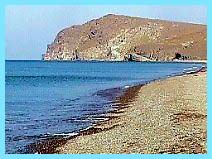 |
 |
 |
|
|||
|
In the Footsteps of the Gods Orpheus, the greatest musician of all time, is wandering the world in a daze, overcome with grief after losing the love of his life, twice. He encounters a group of maenads, the female followers of Dionysus, who insist he join in their revels. When Orpheus refuses, they tear him apart and toss the pieces of his body into a river. Orpheus's head floats out to sea and drifts to the island of Lesvos. Now when Orpheus' head is found, songs and prophecy still flow from his lips. The islanders bring the head to a cave where it continues to foretell the future, until Apollo himself comes to Lesvos to tell the disembodied seer to cease and desist. It seems he's competing with the oracle of Delphi. 
Following in the footsteps of the gods, I travel to Lesvos with visions of romantic adventure on what's reported to be one of the most serene beaches on all of the Greek Islands: Skala Eressos. And there's another attraction, for me the ultimate lure, the promise of music. Surely the place where Orpheus last sang would still celebrate his legacy. Surely the voice of the gods must still echo in the mountains of this island. The third largest of the Greek islands, Lesvos is about 60 miles long and 40 miles wide, with two large, well-protected harbors carved into the interior. The land is hilly and mountainous and much of it is covered with olive trees. They say that in ancient times, the oracles listened to the whisper of wind in the trees to foretell the future and divine the wishes of the gods. You can no longer find Orpheus' oracular cave on Lesvos. But there are centers of worship here. At a monastery, one of over half a dozen that dot the island, the monks mark the call to prayer by striking a wooden board called a tallando with a mallet. There are but three monks in this particular monastery. And when, through a translator, I ask one of them, a young man in his twenties, if there is any connection they feel between the worship of Orthodox Christianity and the legacy of the ancient gods, he says, "You mean those people who were here before the time of Christ?" When I nod my head, he extends his arm, palm up, as if pronouncing a sermon or stopping an invisible flow of traffic and says "Idolaters!"
Monk: "The answer is no, there is no connection. They were idolaters before Christ..." So, the ancient gods may be dead, or silent, or just waiting. In any case, it turns out that Lesvos is a pilgrimage site after all. One of the greatest lyric poets of all time was born in the village of Eressos in the 7th century BC. She was called "the Tenth Muse" by none less than Plato. In the 11th century, her work was banned by the church and much of it was burned. Still, fragments of the poems of Sappho have survived and have even been set to music. 
Sappho's work has come to be revered by women who love women. They've taken the word Lesbian from the name of this island and made Eressos, Sappho's birthplace, a prime travel destination. Somehow, the guidebook I read never mentioned this. At any rate, on the eve of my arrival, I learn that the first annual Lesvos women's festival is about to take place. I have inadvertently landed in the epicenter of Lesbian life on Earth. In light of my fantasies of romantic beach adventures, traveling in the footsteps of the gods, I imagine Artemis, goddess of the hunt, smiling wryly. Nevertheless, we independent radio producers know a story when it's staring us in the face. I seek out Joana Savva, co-owner of Sappho Travel and one of the organizers of the women's festival.
Joana: "About five or six years ago, the locals started to throw out the gay women, the lesbians from Eressos. The result was that Eressos was empty. About two years, nobody was coming. They understood eventually that this was the tourism that we have. We like them so long as that they don't cause problems with the locals. Actually, most of the local people, they love the gay women. They want them in their rooms. We even have two women-only hotels." Armed with all this knowledge, I am still determined to see if the spirit of Orpheus lives on in the music of Lesvos Island. Years ago, I heard a haunting recording that was made on Lesvos of a santouri, a hammered dulcimer. But after a day of searching in the town of Agassios, I learn that most of the older santouri players have died. And, a number of local musicians cannot be persuaded to sing or play on demand for any reason. Disappointed, I wander among the many pleasant tavernas that line the beach on Skalla Eressos. And then, perhaps the gods take pity on me, for a waiter at one of the tavernas walks by with a guitar, and encouraged by the sight of a microphone and a few glasses of raki, the local drink of choice, he begins to commune with his muse. A crowd of people gathers round, drawn by the music. Mostly women, to be sure, but mixed couples as well, Germans, Scandinavians, Dutch, English, very few Americans. Unasked for, a whole tray of shots of raki appears and is offered round to singers and audience alike. The breeze off the ocean picks up just a bit, and voices join in, as if, for a brief moment, a hymn of praise is being offered up to the ghosts of Orpheus and Sappho. On the Greek Island of Lesvos, I'm Jim Metzner for The Savvy Traveler.
|
 | American Public Media Home | Search | How to Listen ©2004 American Public Media | Terms of Use | Privacy Policy |
